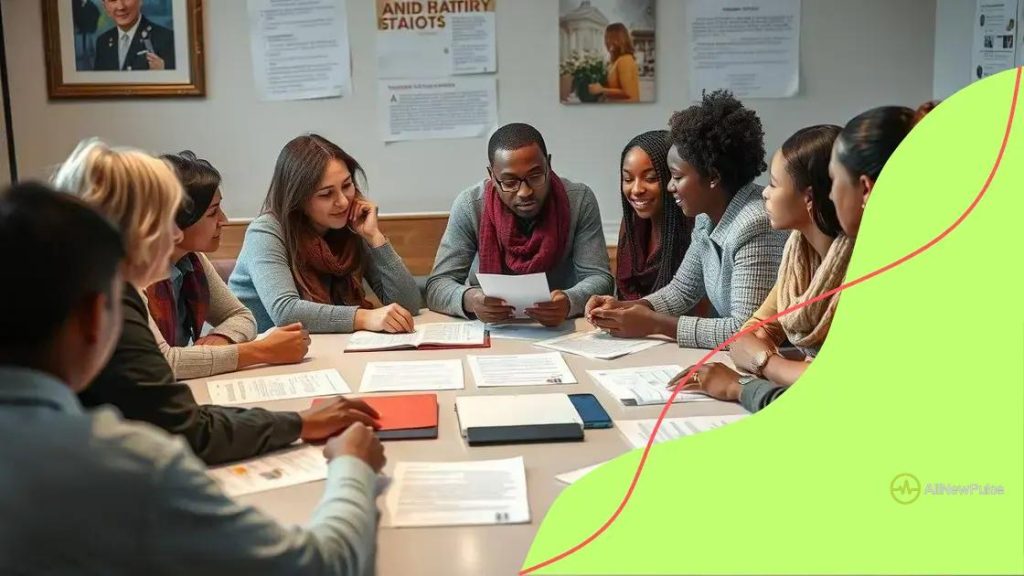Discussions regarding the integrity of elections

Discussions regarding the integrity of elections focus on enhancing transparency, combating misinformation, and fostering public trust to ensure fair and credible electoral processes.
Discussions regarding the integrity of elections have become increasingly vital in today’s political landscape. Have you noticed how these conversations influence our views on democracy? Let’s delve deeper into this important topic.
The role of transparency in elections
Transparency in elections plays a vital role in ensuring a fair democratic process. It helps build trust among voters and can significantly affect the outcome of elections. When people see that systems are clear and open, they are more likely to participate.
Why is Transparency Important?
One fundamental reason transparency matters is accountability. When election processes are visible, it is harder for misconduct to go unnoticed. Citizens feel safer knowing they can observe how votes are counted or how candidates are selected.
Key Elements of Transparency
- Open access to election data and results.
- Public availability of instructions for voting and counting procedures.
- Observations by independent monitors during elections.
Another essential aspect is communication. Clear and timely information from election authorities helps demystify the process. When voters understand what is happening, it reduces confusion and frustration that can arise.
Diverse groups of people should have the opportunity to engage with the electoral process. Encouraging community participation through education about their rights and the voting process fosters a culture of transparency.
Challenges to Achieving Transparency
Unfortunately, there are always challenges to transparency. Some election officials may feel hesitant to share information, fearing it might lead to misunderstandings. Misleading information could also spread rapidly, creating skepticism among voters.
To combat these issues, consistent efforts must be made to ensure the flow of accurate information. Sufficient training for election officials, clear guidelines for communication, and resources for the public can all help mitigate these challenges.
When transparency is prioritized, it has remarkable benefits, such as increased voter confidence and participation. Voters who trust the integrity of the electoral process are more likely to exercise their right to vote, ultimately strengthening democracy.
Understanding voter fraud and its perceptions
Understanding voter fraud and its perceptions is critical in discussions about election integrity. Many people fear that fraudulent activities influence election outcomes, but how much of this fear is founded on facts?
To grasp this issue, we must first distinguish between actual fraud and misconceptions. Reports of voter fraud vary widely, and many claims often lack substantial evidence. It’s vital to approach this topic with clear eyes and critical thinking.
Common Types of Voter Fraud
Some might wonder what forms voter fraud can take. Here are a few examples:
- Double voting – casting ballots in multiple locations or elections.
- Impersonation – someone voting while pretending to be another voter.
- Dead voters – casting a vote in the name of deceased individuals, which is extremely rare.
While these examples exist, statistical data shows that occurrences are minimal compared to the number of votes cast.
The Impact of Perception
Perception plays a huge role in shaping public opinion about voter fraud. Misleading reports in the media can inflate fears, leading to mistrust in the electoral process. This fear can discourage people from voting, believing their participation might not matter.
To combat misinformation, education is key. Voter education programs can help people understand the facts about voting. They can empower citizens to recognize myths and encourage them to participate confidently in elections.
Various stakeholders, including governments and non-profit organizations, should work together to promote accurate information. Creating a culture of trust in the voting system can significantly reduce fears around voter fraud and increase voter participation. Every effort made to clarify these issues can help foster a healthier electoral environment.
The impact of social media on election integrity

The impact of social media on election integrity is significant in today’s digital age. Many voters turn to social media platforms for information, which can shape their opinions and decisions. This influence can be a double-edged sword.
On one hand, social media can promote transparency and encourage civic engagement. It allows for rapid dissemination of important information about the voting process and can connect voters with reliable resources. However, misinformation spreads just as quickly, often leading to confusion and distrust.
How Misinformation Affects Elections
False information about candidates or voting procedures can create panic or apathy among voters. Examples of misinformation include:
- Incorrect voting dates or procedures.
- False claims about candidates’ actions or policies.
- Unfounded accusations of voter fraud.
This type of misinformation can lead to fewer people voting, as they may feel uncertain about the process or the integrity of their votes. It is crucial for social media companies to actively combat false claims to maintain trust in the election process.
Positive Uses of Social Media
Despite the risks, social media offers opportunities to enhance election integrity. Campaigns can use these platforms to engage with voters, share accurate information, and debunk myths quickly. This helps create a more informed electorate, boosting participation.
Additionally, organizations can utilize social media to remind voters of important deadlines and provide resources about their voting rights. Engaging posts and educational content can empower voters, ensuring they understand the importance of their participation.
In summary, the impact of social media on election integrity involves balancing the benefits of communication with the challenges posed by misinformation. As platforms continue to evolve, so must our strategies for ensuring that elections remain fair and transparent.
How international standards shape election integrity
International standards have a profound impact on shaping election integrity around the world. These standards provide guidelines that help ensure elections are free, fair, and transparent. They serve as benchmarks for countries to follow, promoting democratic values globally.
Countries that adhere to these international standards often experience enhanced trust in their electoral processes. For instance, organizations such as the United Nations and the Organization for Security and Co-operation in Europe have set specific guidelines aimed at promoting a fair election environment.
Key International Standards
Several critical standards influence how elections are conducted:
- Universal suffrage ensures that all adults have the right to vote.
- Secret ballot protects voter privacy during elections.
- Equal access guarantees that all candidates have the same opportunities to campaign.
- Independent electoral bodies help manage elections without political interference.
These standards lay the groundwork for fair practices that can help minimize fraud and encourage greater voter participation.
The Role of Monitoring
International organizations often send observers to monitor elections, ensuring that these standards are upheld. Their presence provides an extra layer of accountability. Observers can report violations and recommend improvements for future elections.
Moreover, these monitoring missions educate local officials on international best practices. This sharing of knowledge can boost the overall integrity of electoral processes in different countries, enabling them to learn from each other’s experiences.
The adoption of international standards also helps build a culture of respect for electoral processes. When countries commit to these practices, they signal to their citizens and the world that they prioritize fair governance.
Steps to enhance public trust in electoral processes
Enhancing public trust in electoral processes is crucial for a healthy democracy. When citizens believe in the integrity of elections, they are more likely to participate actively. Several steps can help build this trust and ensure that all voices are heard.
First, ensuring transparency in every aspect of the electoral process is vital. Voters should have access to information about how elections are conducted, including details on how votes are counted. This openness helps dispel fears of corruption.
Key Steps to Build Trust
Some effective strategies to enhance public trust include:
- Conducting public education campaigns about the voting process.
- Involving independent observers during elections to monitor procedures.
- Implementing secure and reliable voting technology that citizens can trust.
- Establishing clear procedures for addressing and investigating any claims of fraud.
These steps promote a culture of integrity and accountability among election officials, helping citizens feel secure in their participation.
Engaging the Community
Another essential step is community engagement. Encouraging local organizations to hold discussions about the electoral process fosters trust. When communities feel involved, they are more likely to believe in the system.
Facilitating open forums where citizens can voice their concerns can also strengthen trust. This approach helps election officials understand the needs of the public and work to address potential issues that may hinder voter confidence.
Lastly, maintaining effective communication throughout the election cycle is critical. Regular updates provide voters with the information they need, helping to mitigate feelings of uncertainty or confusion.
By implementing these strategies, we can create a more trustworthy electoral environment, leading to higher voter participation and stronger democracies.
FAQ – Frequently Asked Questions about Election Integrity
How can transparency enhance public trust in elections?
Transparency allows voters to see how elections are conducted, reducing fears of corruption and increasing confidence in the process.
What role does community engagement play in improving election integrity?
Community engagement encourages voter participation and helps the public feel involved in the electoral process, which boosts trust.
How can misinformation affect voter turnout?
Misinformation can create fear or confusion about the voting process, leading to decreased voter turnout as people may feel uncertain.
What measures can be taken to combat election-related misinformation?
Educating voters about the facts and providing accurate information through public campaigns can help combat misinformation effectively.





